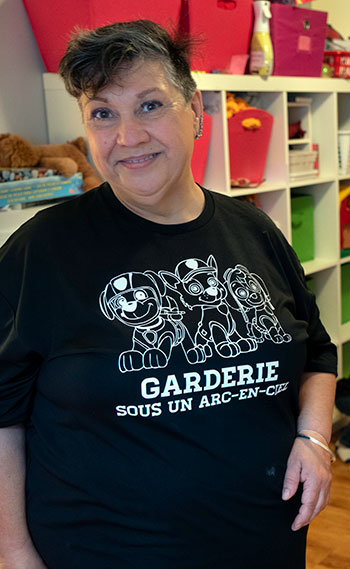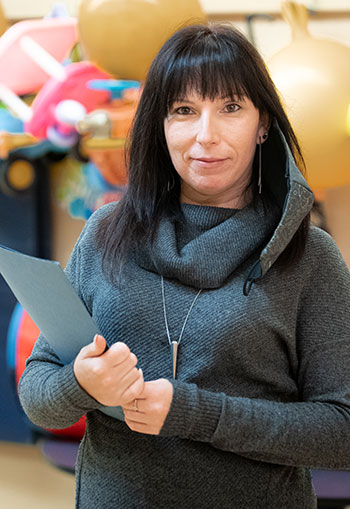In March 2020, the COVID-19 virus caused the temporary closure of early childhood educational services. Their reopening required that workers review all of their procedures - without warning. How is it going in the field?
CSQ Le Magazine spoke with Diane Rufh, regulated and subsidized home care educator (HCE), and Julie Mineault, an educator at the CPE La Cigale et la Fourmi, to learn more about the real consequences the pandemic has had on the ways they operate in their work environments.
CSQ Magazine: What new professional challenges have you encountered because of the pandemic?
Julie Mineault (JM): For me, it was getting used to working with a mask and eye protection. Communicating with the parents was also quite a challenge, as we couldn’t see them anymore. I had to share everything in writing. It’s a whole new ballgame!
Also, we had to adapt our teamwork. Because of the bubble concept, we can no longer pair groups or have group meals. But all in all, I was surprised at how quickly humans adapt to change.
Diane Rufh (DR): When I reopened my home care educational service for parents working in essential services, I had to rethink what to keep and what not to keep in my centre. I had to plan and sort everything out. I removed anything difficult to wash, such as costumes, blankets, and stuffed animals. I also had to find the time to disinfect and clean everything every day. Children put their hands everywhere! Whenever possible, I also ask parents to pick their children up earlier, so I have time to do everything.
Diane Rufh, in your opinion, is having a home care educational service an advantage or disadvantage during a pandemic?
DR: Both. There are fewer children on the plus side, so fewer parents showing up at the door and less human contact that could spread the virus. Also, as I’m self-employed, I control my environment, and I disinfect and clean my way.
The disadvantage, however, is that the children are walking around everywhere. At first, I tried to separate them to create bubbles for each child. But even with this system, they find a way to stick together. They are social beings. They practically share the same popsicle in the summer!

How do you explain COVID-19 to children?
DR: Some of the parents are essential workers. Their little ones already know that a virus is circulating. Otherwise, it’s very difficult to explain. At one point, I took hair and told them that the virus is even smaller. They used magnifying glasses to understand better.
JM: I explained it as a very contagious virus, like a cold, but more dangerous for some people. This is why it’s essential to wash your hands and respect everyone’s bubble. Fortunately, parents are also doing their part.
What tips and advice would you give a new HCE or educator joining the network at this time?
DR: First, start the morning with a delicious cappuccino, and second, know where to set your limits. At the end of the day, I’m exhausted! I’ve made it a point of finishing no later than 6:30 p.m. I stop everything and put aside what I haven’t completed until the next day, so I have time for my personal activities.
JM: I would advise them not to downplay the importance of being organized! We need to plan cleaning and disinfecting tasks ahead of time because this new responsibility is on top of what we already have to do. Also, don’t hesitate to ask your team for help.
How are your little ones experiencing this difficult time?
DR: This health context isn’t easy for children. They can no longer use musical instruments. They know they won’t be able to wear the costumes. They miss some of the toys.
It’s even more difficult for children between the ages of one and three who are developing their language skills. When I wear a mask, they are no longer able to read my lips. They observe everything at this age.
But they don’t seem too bothered. Children adapt better than we think.
JM: I take care of the 4-year-old group at the CPE. I must say that they understand the instructions well. The changes were, therefore, easily incorporated into their usual routine. I would also agree that it’s more complex with the younger children who sometimes have difficulty respecting the concept of a bubble and the division of spaces.

What did you take for granted before the pandemic that you will appreciate more once it is over?
DR: Going to the park and playing outside! We now avoid the park because we know the playground installations aren’t systematically disinfected. Educational outings, such as going to the sugar shack, or picking apples and pumpkins! I can’t wait not to be afraid to touch someone, a cat, a dog, and, most of all, to give hugs!
JM: Without question, communicating and exchanging with parents! This is an essential part of adequately preparing their children for primary school.
Will you keep certain sanitary practices as part of your routine once the pandemic is over?
DR: Absolutely. In the past, when I changed a diaper, I changed my gloves between each child. Today, not only do I change my gloves, but I also wash my hands. The children and parents have gotten into the habit of washing their hands when they arrive. This is a habit I want to keep because it can only be beneficial.
JM: The children are learning the importance of washing their hands and maintaining good hygiene, which can only help reduce the transmission of colds and the flu.
Can you share a funny anecdote about an experience with the children since the start of the pandemic?
DR: After using the mattresses, the children put their bedding away in their lockers. For my part, I spray the beds to disinfect them before putting them away. I’ve forgotten a few times, and let’s just say - the kids are quick to remind me! I try to make sure this doesn’t happen too often!
JM: A child arrived one day and said to me, “Julie, you’re going to be mad. I broke a toy by accident!” I told them I was disappointed but that these things happen. The little one then said, “Julie, with your mask on, I can’t see, are you angry, yes or no?
